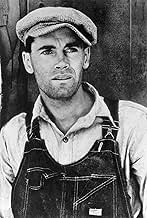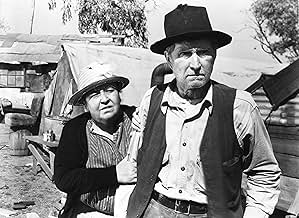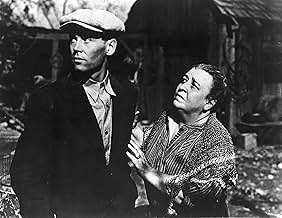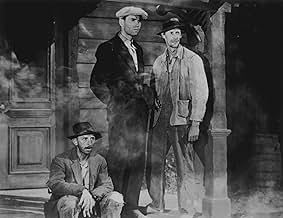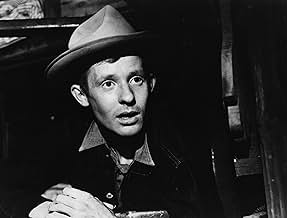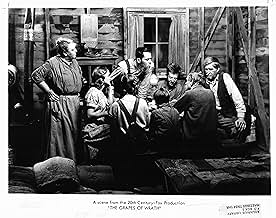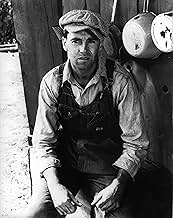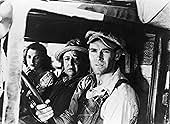Une famille pauvre du Midwest américain est forcée de quitter ses terres. Ils voyagent vers la Californie, subissant les malheurs des sans-abri de la Grande Dépression.Une famille pauvre du Midwest américain est forcée de quitter ses terres. Ils voyagent vers la Californie, subissant les malheurs des sans-abri de la Grande Dépression.Une famille pauvre du Midwest américain est forcée de quitter ses terres. Ils voyagent vers la Californie, subissant les malheurs des sans-abri de la Grande Dépression.
- Réalisation
- Scénario
- Casting principal
- Récompensé par 2 Oscars
- 13 victoires et 6 nominations au total
Résumé
Avis à la une
Of course the most controversial parts of the book are left out (like its final image, for example), but Ford still managed to work around the constraints forced upon him to fashion a hard-biting film. Henry Fonda is perfect casting for Tom Joad--never have his otherworldly eyes been used to greater effect. And Jane Darwell is pitch-perfect as Ma Joad--she captures the tough-as-nails dignity that the character has in the novel. The whole movie is lit by expert cinematographer Gregg Toland, who uses shadow and reflection to cast a ghostly pall over everything. Indeed, much of what Ford wasn't able to include in the film as words he communicates instead through images, and isn't that what a good book-to-film adaptation should do? One of those films that feels ahead of its time.
Grade: A
Besides Fonda and Darwell, the supporting cast features plenty of good supporting players, including Charley Grapewin and John Carradine. All of them make their characters come alive believably. They also fit together well and complement one another's performances, which accentuates the themes involved in the struggles of the Joad family.
For all that the Steinbeck novel is so revered, and for all that his story is an often compelling depiction of its characters, with whom many in the era could identify, it would have been better if it had not been so heavy-handed. Even given that the times were bad, more balance in the characters outside of the family, and in the Joads' experiences, would have made it an even better story. Certainly, this is barely even noticeable when compared with the stories in many present-day movies and novels, which often dispense with any attempts at plausibility.
And that does not stop this adaptation from being a worthwhile and often moving film. Ford clearly appreciated the potential in the material, and he and the cast work together to make each character count, and to give meaning to each scene.
Henry Fonda plays the part of Tom Joad, a young member of the family who is released from prison at the beginning of the film, only to find that his family has been driven from their home and is staying at his uncle's house until they can figure out what to do about their sudden homelessness. It is by pure coincidence that Tom was released early on good behavior, otherwise he may very well never have seen his family again. He finds them in a state of near desperation, as they begin more and more to realize the predicament that they are in. Their trek across half of the country, on their way to California to assume jobs that they've heard about, provides for a substantial portion of the plot and is extremely well-structured.
The family encounters every hardship imaginable on this journey, from family members dying to their struggle to feed themselves to their rickety old truck constantly breaking down. They run into disillusioned people who claim that they've been to California and there are really no jobs there, at least not nearly as many as there are people going to look for them. They are periodically and derogatorily referred to as `Okies,' a term which places them in a broad category of poor folks driven from there homes in middle America who are traveling to the coast to get jobs that aren't there. There is so much doubt and hardship presented that it is never really certain whether they really will find jobs. The audience is never able to assume a happy ending, because there is so much contrary foreshadowing throughout the film.
The struggles do not abate once the family reaches California and takes up shaky residence in residential areas that would be more accurately referred to as shanty towns, and the rest of the film is dominated by the family's efforts to survive in a new and unfamiliar place, while working for wages that are barely sufficient to prevent starvation. Ma Joad spends the majority of the film stressing the importance of keeping the family together, seeing it as the only thing that they really had left, but this is eventually set aside in favor of each member of the family not only surviving but also flourishing, which provides for one of the many powerful messages that the film delivers.
The Grapes of Wrath is not exactly an edge of your seat film, but it is a shockingly realistic portrayal of the suffering that so many people and families experienced during the Great Depression. The performances are flawless, and the experience is not only powerful and moving but also educational. It's no secret that most people do not watch movies to learn, but there comes a point, at least once in a great while, when a person should watch a film that requires a little mental thought processing, and in such cases, The Grapes of Wrath is an excellent choice.
I think their must have been more then one car because ours was full of stuff in the back seat, clear up almost to the roof. Frankie, Bill and me (my brothers) all was on top of the stuff in the back seat, had to stay lying down was not enough room to set up. What I remember most about the trip was it was awful hot when we went through Arizona and we had not much water, the water we had was in a canvas bag, hooked to the front bumper to help keep it cool. We did not get much because dad was saving it for the car when the car got to hot. Mom told us to suck on pebbles, and we did. It was a bad time every where. No jobs or anyway to make any money.
We were going to California because their was suppose to be some picking work their, after we got to California we saw miles of potatoes all loose piled up high my guess would be about six feet high, they had put lime or something that looked like lime it was a white powder to keep people from taking them to eat.
We found a place to pick plums that they used to make prunes and we lived in a Quonset hut made of corrugated metal setting on a concrete slab. The public toilets were near were we stayed, Joe and his wife (Family friends)had their own Hut this was the time that dad & Joe would sell tickets for people to watch them box each other in a ring at the recreation hall on the property. Also they joined a baseball team and played baseball, dad played left field. We got to watch them play for free.
Seems like Frankie and I played together a lot don't think Bill did because he was still a baby his self, Doris and Dorothy (my sisters) was still crawling so Bill could not have been very old at that time. Frank & I would go pick up plums off the ground and we would bring them home, Doris and Dorothy would set in the box and eat them. You can guess what they would look like when mom and dad got home, their was no air condition back then so they would take a hose and squirt water on the tin Quonset hut to try and cool it off some, I know when we went west we looked like those grapes of wrath folks in the movie.
That area was the first time I ever saw a frog walk, it was to hot for them to hop, when they tried to hop their bellies would touch the ground ( gravel) and would burn them, any way that's what we thought at that time. I saw the movie of Grapes of wrath a long time ago, and I remember it so well, I cried most of the time it was on because it reminded me of the hard time we all had back then, I was born in Oklahoma and it was just a terrible time in the late thirties I would love to see the movie again, its to me a history of my family, I am 71 1/2 years old now and still remember it very clearly.
Gene McDaniel
This is not the usual Hollywood fare. Tragedy and betrayal beset the Joad family from the outset. But it is nonetheless an uplifting movie. Spirit, compassion and tenderness mark them out. Fonda's role is particularly understated, and we see, as in Steinbeck's masterly epic, the maternally robust figure of Ma holding the family together.
The performances all round are wonderful, and Ford's direction and sense of space under the big sky of the Midwest is breathtaking.
This film is now largely a testament to the time in which it was set, but like the war movies that were soon to follow, a story that needed telling lest we forget.
Le saviez-vous
- AnecdotesPrior to filming, producer Darryl F. Zanuck sent undercover investigators out to the migrant camps to see if John Steinbeck had exaggerated about the squalor and unfair treatment meted out there. He was horrified to discover that Steinbeck had actually downplayed what went on in the camps.
- GaffesThe character, Noah (Frank Sully), after he's seen playing with his boat in the river, simply drops out of the story without any explanation, and does not appear again. In the book there is a brief reference to him going off on his own, but no explanation, whatever, is given in the film for his departure.
- Citations
Tom Joad: I been thinking about us, too, about our people living like pigs and good rich land layin' fallow. Or maybe one guy with a million acres and a hundred thousand farmers starvin'. And I been wonderin' if all our folks got together and yelled...
Ma Joad: Oh, Tommy, they'd drag you out and cut you down just like they done to Casy.
Tom Joad: They'd drag me anyways. Sooner or later they'd get me for one thing if not for another. Until then...
Ma Joad: Tommy, you're not aimin' to kill nobody.
Tom Joad: No, Ma, not that. That ain't it. It's just, well as long as I'm an outlaw anyways... maybe I can do somethin'... maybe I can just find out somethin', just scrounge around and maybe find out what it is that's wrong and see if they ain't somethin' that can be done about it. I ain't thought it out all clear, Ma. I can't. I don't know enough.
Ma Joad: How am I gonna know about ya, Tommy? Why they could kill ya and I'd never know. They could hurt ya. How am I gonna know?
Tom Joad: Well, maybe it's like Casy says. A fellow ain't got a soul of his own, just little piece of a big soul, the one big soul that belongs to everybody, then...
Ma Joad: Then what, Tom?
Tom Joad: Then it don't matter. I'll be all around in the dark - I'll be everywhere. Wherever you can look - wherever there's a fight, so hungry people can eat, I'll be there. Wherever there's a cop beatin' up a guy, I'll be there. I'll be in the way guys yell when they're mad. I'll be in the way kids laugh when they're hungry and they know supper's ready, and when the people are eatin' the stuff they raise and livin' in the houses they build - I'll be there, too.
Ma Joad: I don't understand it, Tom.
Tom Joad: Me, neither, Ma, but - just somethin' I been thinkin' about.
- Versions alternativesInternational distributions (e.g. UK) have a short ~30 second prologue at the beginning to explain the historical context to the story to touch on the socio-economic problems in the US which arose during the Great Depression and the concurrent Dust Bowl.
- ConnexionsEdited into John Ford, l'homme qui inventa l'Amérique (2019)
- Bandes originalesRed River Valley
(uncredited)
Traditional
Played during the opening credits and often in the score
Sung by Henry Fonda at the dance
Meilleurs choix
Détails
- Date de sortie
- Pays d’origine
- Langue
- Aussi connu sous le nom de
- Las viñas de la ira
- Lieux de tournage
- Santa Rosa, Nouveau-Mexique, États-Unis(service station, diner, bridge, train sequence)
- Société de production
- Voir plus de crédits d'entreprise sur IMDbPro
Box-office
- Budget
- 800 000 $US (estimé)
- Montant brut mondial
- 7 304 $US
- Durée
- 2h 9min(129 min)
- Couleur
- Rapport de forme
- 1.37 : 1


